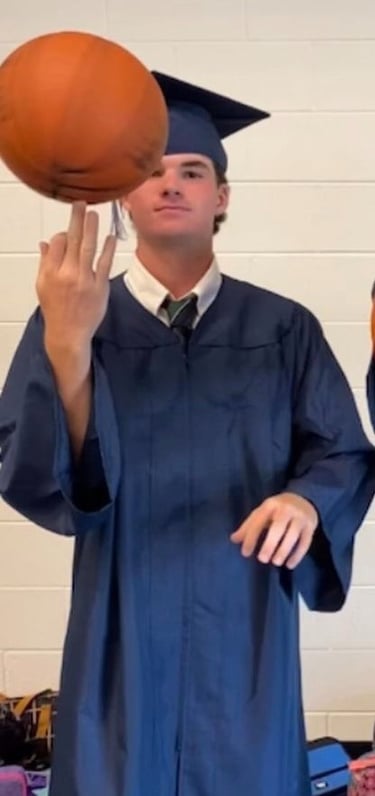

Thoughts From D1 Commits Who Are Dual-Sport Athletes
1/23 CGC Staff
When they are young, most athletes play multiple sports during the year, with a love of many and no desire to concentrate on only one sport. It is beneficial for children to try as many sports as possible to help them find their passion, and cross train to prevent overuse injuries or burnout. The teenage years are when we see athletes starting to drop a sport and focus on two or three, then possibly whittle the list down to one. For a golfer whose goal is to commit to a division 1 college, golf can be very time consuming, spanning multiple seasons in the year, with significant travel involved. It can be difficult to balance the time demands of golf and other sports such as basketball, soccer, etc, as many sports at a high level have become very travel oriented and involve a year-round commitment. By sophomore year of high school, many golfers drop their other sports to focus on developing their game for college, but we found several athletes who figured out how to balance their time and manage to commit to division 1 schools while playing an additional varsity sport.


Luke Brandler is the 19th ranked golfer in the class of 2025 on Junior Golf Scoreboard and is verbally committed to play golf at Princeton University. While honing his craft as a competitive golfer, Brandler is obviously a strong academic student and plays varsity soccer for his high school. He had a unique upbringing, living in Hong Kong and moving to the US at the beginning of high school. He was able to play club soccer while in Hong Kong but only plays in the high school season in his hometown of Pebble Beach, California. “I have been playing both golf and soccer for as long as I can remember and started playing competitively at a pretty young age, around 7 or 8 years old,” Brandler shares. His parents introduced him to almost every sport when he was young, and he narrowed them down to soccer and golf when he was 12 years old. In addition to tournament golf, Brandler also plays on his high school team. Brandler chose Princeton because education was always a priority for him, and “Princeton has one of, if not the best education in the world. On top of that, I loved the campus, the team and the culture there which ultimately helped make the decision a clear one.


Connor Kiel hails from Fairport, New York, and is a class of 2024 signee with division 1 Siena College. He started playing basketball at the age of four but didn’t pick up golf until he was ten years old. Connor found a love for golf and realized that it would be his focus in 7th grade, but he continued playing basketball and has contributed to his varsity team in high school. He also plays for his high school team in addition to playing tournament golf. Kiel chose Siena because of the facilities, the coaches, and players on the team who were also dual-sport athletes. He says, “The coach is an incredible guy and really knows how to work with college golfers and improve all aspects of their game. Their home course, schedule, and indoor facilities are all incredible and will allow me to become a much better golfer over the next four years.”


Photo: @lukelibbey instagram
Photo: @lukebrandler16 instagram
Photo: @connorkiel_ instagram
Photo: Deposit photos
Luke Libbey is a class of 2024 signee with division 1 Liberty University, and lives in Lynchburg, Virginia. Libbey chose Liberty because of the faith, the culture, mountain facilities, and the experienced coaching staff that has the athletes’ best interests in mind. Like Kiel, he plays on his high school varsity basketball team, and also ran cross country for the first few years of high school. Libbey started playing competitive golf at age 7 but didn’t start playing in tournaments on a regular basis until the end of middle school. He began playing basketball at age 5. We found it interesting that Libbey started the golf team at his high school, and he shares, “During my freshman year I played as an individual but after that I recruited some of my friends and we made a team. We started with 5 of us and now this year, we’ve got around 9 people playing.”
Playing two competitive sports can be a balancing act for student athletes, as it is difficult to fit practice time in for one sport while the other is in season. Many high schools do not excuse players from practice or a game to participate in an outside sport, or they have a limitation on how many days an athlete is allowed to miss. Brandler stopped playing club soccer once he got to high school, saying, “It's a bit easier to manage my time since high school soccer is only one season. Nonetheless, throughout the soccer season (which is in the winter in California), I cannot practice golf as much as usual. I make use of the weekends where I have time to play on course the whole day or get good practice in and try to go practice during free periods in the school day throughout the week.” Libbey is able to sneak some golf practice in but lucks out because basketball occurs in the golf off-season for him, stating “The two seasons stay fairly separate because high school basketball doesn’t start until November and ends in March. However, I try to go out once or twice a week to hit balls.” For Kiel, who lives in a northern state, basketball can help fill his time in the cold winter months. “It’s definitely tough working golf into the schedule during basketball season from November up until March, so usually I practice about once per week or two. I’m in New York so that’s the only chance I have to play. Outside of basketball season I mainly play golf with a few days here and there practicing basketball or doing basketball specific workouts,” he adds.
“Both golf and basketball have a lot to do with confidence and require different types of mental strength. Playing both really works all parts of the mental game to where I’m ready for anything my future career in golf will throw my way. Also, in basketball and golf you realize you can’t get too emotionally high or low depending on what’s going on.” -Connor Kiel
While many people think that golfers should focus solely on golf in hopes of earning a college scholarship, there are several benefits to being a dual sport athlete. We asked each athlete how golf helps them excel in their other sport and vice versa, both mentally and physically. They each brought up several key points. “Both golf and basketball have a lot to do with confidence and require different types of mental strength. Playing both really works all parts of the mental game to where I’m ready for anything my future career in golf will throw my way. Also, in basketball and golf you realize you can’t get too emotionally high or low depending on what’s going on,” shares Kiel. Both sports help him stay in a neutral mindset. Both Brandler and Libbey find that competing in highly aerobic sports helps them physically, allowing them to get faster and stronger. It is easier to carry a bag for 18 holes when their conditioning is high. Brander also finds that playing in a team sport will help translate to college golf, “I also think that the team aspect of soccer is extremely beneficial as it helps me develop leadership and teamwork skills, which translates into high school and eventually college golf, where you're playing on a team.” We also asked each golfer what lessons they have learned from basketball or soccer that can translate to playing college golf, and they gave some insightful answers. Brandler focuses on the mental strength he has gained, noting “I think that ultimately the biggest lesson is seeing that success comes from hard work, no matter what sport or walk of life it is. I've learned from playing soccer on the varsity team for 3 years that for us to get better, we need to approach every practice with a good mindset and work ethic, and make sure everything is taken seriously so that we can get better. I think that translates very well into competitive golf and how I now practice during the golf season. I try to get better every time I play and practice.” Kiel talks about having a game plan and strategy, “I’ve learned that you have to stick to your game plan that you started a practice, game, or season with and trust it. Also, trust that you’re prepared. You go into a game scouting the other team and that game plan will help you and you can’t deviate if you find a rough patch. It correlates with golf because usually on most courses you map out a strategy. Basketball teaches me that my strategy will work and if I find a few bad holes stretch to not change the gameplan and try and chase the strokes back.” Lastly, Libbey correlates rankings between the two sports, stating “I’ve realized that anyone can win on any night and we’ve beat some teams that are just better than us statistically. So just because someone else’s ranking is better, doesn’t mean you can’t still beat them.” That is so true!


Photo: @lukelibbey instagram
Many athletes think that college coaches always recruit athletes who put everything into their golf game and don’t play other sports. From discussions with several coaches and our three golfers’ answers, that is not the case. Brandler, who was likely a sought-after recruit, shares “Every coach that I talked to didn't have a problem with me playing other sports. I never came across one that explicitly wanted me to focus more on golf.” Libbey had a similar viewpoint, but pointed out the only negative that was brought up was possible injury. Kiel said that coaches viewed his additional sport participation as a positive, “Playing basketball in the winter and taking a sort of 3-4 month break from golf showed the coach that I have a lot of room to grow as a golfer. When I get to college and play 11 instead of 8-9 months out of the year, I’ll be able to get much better there.” Each athlete that we spoke to also sees various positives to being a dual sport athlete, as well as some negatives. It is the perfect topic for Libbey to discuss, as he is doing his senior capstone project on the benefits of being a multi-sport athlete. “One of the benefits is that you become a better athlete. You develop better hand-eye coordination and get stronger. It also gives you a sport to just enjoy with friends. A con would be you don’t have an offseason, but personally I think it’s worth it,” he adds. Brandler also provided some insight, “I think that there are a lot of benefits, including having a better balance in my life, having more fun, getting good exercise (walking the course isn't the best exercise), interacting with different people and a true team environment, and learning all the lessons of hard work, discipline and leadership. The only cons are that playing another sport limits the time I have to practice and focus on golf, and then the risk of injury.” Kiel agrees, mentioning the importance of a team environment in basketball but also the injury risk, “I think some benefits are you get to train your body in different ways that you might not get in golf. You’re able to experience a true team sport where you need to put trust in teammates. The biggest thing for me is the chance to get a break from golf. You can rest from the previous season which eliminates the chance of burning out from golf. There are a few cons, as playing basketball does take away lots of time from practicing or maybe making trips over winter to play golf. There are also injury risks with other sports that you might not find in golf.”

